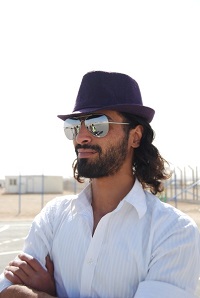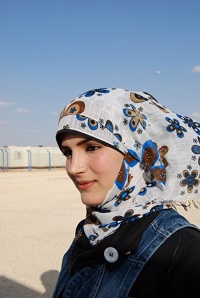Refugee camp’s tough atmosphere disappears in circus tent
Circus trainer in Za’atri dreams about returning home to Syria and starting up the country’s first circus. In Za’atri also girls are now training circus groups. Anwar Abujesh, 25, has a big dream. A year ago he did not know anything about the circus , but now he is dreaming of setting up the first circus group in Syria . Every week day Abujesh trains two boys’ circus groups in Za’atri Syrian refugee camp in northern Jordan, together with Mohammad Qusam Guzlan, 20, and Khaled Shubat, 22.
“There would be magicians, acrobats and elephants balancing in the big tent ,” Abujesh says.
Finn Church Aid (FCA) started humanitarian work in Za’atri refugee camp in the autumn of 2012. Soon, FCA’s employees got an idea that a circus school could be a place where young refugees would unload the traumas of war and being a refugee.
Boys and girls have separate circus tents
In late 2012 Palestinian Nablus Circus School started classes at FCA compound, and last year the Finnish Sirkus Magenta continued operating the circus school for eight months. Since mid-November the Syrian trainers have been in charge. Every day around 40 young Syrian refugees train acrobatics, juggling, unicycle riding and diabolo tricks. Girls’ and boys’ rectangular, beige training tents stand next to each other and dominate FCA’s fenced compound in Za’atri refugee camp’s fourth district. The concrete floors of the training tents have been topped with a PVC mat. When practicing somersaults, flips and other jumps the youth use a thick mattress, made by piling up ordinary mattresses and wrapping them with tarpaulin.
Becoming a father in a refugee camp
Anwar Abujesh started as the assistant trainer for the boys circus groups, but after Magenta left he became the head trainer. He says that a circus trainer’s job is hard, but rewarding. Abujesh has lived in Za’atri camp for a year and half and just recently he became a father of a baby girl.
Abujesh says the circus has made him a new man – internally and externally. “Before, I wore shirts and neat pants and I feel I was arrogant. Now I have become a much simpler man,” he explains.

Za’atri’s boys’ circus groups’ head trainer Abujesh Anwar says the circus changed him a lot internally and externally.
Foto: Terhi Kinnunen
“I laugh more than before” Also, Fatima Hariri, 19, – one of the three girls in the group of circus trainers – says the circus has changed her for the better. “I have met new people. I laugh a lot more than before,” Hariri says. Hariri trains the girls’ circus groups with Wafaa Salamat, 17, and Muna Rifai, 18. According to the trainers circus school is important for many young refugees, because there is not much to do in the camp. The schools operate in two shifts and the school days are only a few hours long. Not all school-aged refugee children go to school. Abujesh Anwar, who used to work as a mathematics teacher, says he makes sure youth in his circus groups go to school. “If there is no school, there is no circus.”
Circus boosts self-confidence
Circus training improves young people’s physical fitness, but also increases their self-esteem and trust in other people. Circus tricks also help them to forget the reality of living in a refugee camp. Anwar Abujesh says that in the beginning some people were disrupting the classes with their bad behaviour, but now these young people have learned to concentrate.
Girls’ trainers say their students have become more confident. Six months ago, 14 -year-old Hala Zoubi was so shy she refused to do anything in front of the other girls and she often used to burst into tears. Now she is passionate about acrobatics and has become braver. “I have become stronger,” she says. “When I grow up I want to be a doctor.”
Girls’ tent’s windows are taped shut
Most Syrian refugees in Za’atri are from Daraa in southern Syria. People from that region are not as highly educated as those from big cities. Many have very conservative views, for instance on what is appropriate for girls and how they should behave.
The girls have their own tent and its’ windows have been taped shut. Around the tent there is a black plastic fence to prevent the boys from peeping in at the girls in the tent. Girls’ circus groups cannot perform in front of boys or men.
Initially many parents opposed their daughter’s circus hobby. But they changed their minds when they got to see the circus show. FCA has organised discussions with parents to tell parents about the circus school.
“My parents think that the circus tent is the place where we can get out of the bad atmosphere of the camp. It is a place where we can laugh and enjoy”,Muna Rifai says.
Public perfomance is the goal
The trainers and other adults emphasise the circus’ social and mental aspects. For most youth training is foremost organised playing with friends and one can learn to do impressive tricks. Especially with the unicycle.
Everyone’s wish is to perform in front of the audience, for instance in one of the schools in Za’atri. But a circus performance in a refugee camp requires many permits and safety plans. At the end of each week, the boys perform a circus show in their tent. Sometimes FCA staff is in the audience, often there is nobody. When FCA hosts guests, the boys circus groups always want to show their tricks to the guests.
Adnan Askar, 14, Mohammad Al- Raba’iy, 15, and Mohammad Al- Zoubani, 15, would like to have circus practice every single day.
They are confident they can impress the audience with the tricks they have learned. If Anwar Abujesh in the future to sets up Syria’s first circus group, many of the performers have probably developed their love for circus in Za’atri . Many young refugees dream of becoming circus professionals. “We want to continue the circus even when we go back to Syria”, Muna Rifai says.

“In the circus we forget the bad atmosphere of the camp”, says Muna Rifai, 18. She is one of the Syrian girls’ circus trainers. Foto: Terhi Kinnunen
Text and photos by Terhi Kinnunen 28/02/2014